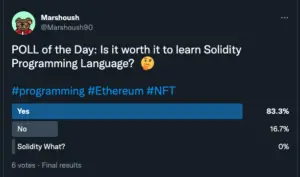Whether you are a programmer or someone that is interested in the Blockchain technology you may have saw a programming language called solidity and wondered if it’s worth it to learn.
Main reason for learning solidity is for developing smart contracts. Especially when it is used as a programming language for the Ethereum blockchain.
In this post we will briefly discuss about fundamental reasons why you should learn solidity.
Quick Recap
Before we start, let us go through what is solidity and how it is positioned from learning point of view.
Solidity is basically an object oriented programming language that designs and execute smart contacts.
This language allows to create Blockchain network smart contact like developing decentralised applications. When we say decentralised applications (dApps) they are basically contract that you can interact with by submitting data or paying with relevant cryptocurrency which then deliver scripted output as a result.
Examples of these applications could be decentralised product and services, Cryptocurrencies, NFTs and more.
Where does it stand?
OK, if you are planning to work in the cryptocurrency/blockchain field, you may wonder what are the different type of jobs you could get?
To simplify it we can categorise them into three positions.
Blockchain engineer: who develops and support the network as a whole.
Miner: responsible for validating transactions.
Smart contract developer: making computerised contracts (and here where solidity lies)

Attribution: The icons has been designed using resources from Flaticon.com
Let us see the reasons why it is worth to learn solidity.
Blockchain Technology Continues to Thrive
Blockchain technology has been around more than a decade since 2008, users who are into decentralisation are highly engaged with it. And it also got centralised organisations attention.
With strong security and the capability to implement automated processes on an immutable ledger, this technology is expected to continue to thrive over time.
As a solidity programer you will be contributing as a key factor in this continued development.
Solidity is Most Popular Language for Ethereum
Solidity is utilised as the main smart contact programming language for Ethereum which is the second largest cryptocurrency network after Bitcoin.
So by learning solidity you are basically learning to develop in one of the largest networks in the industry which has high demand.
It means learning this language is also going to allow you to have an impact in the Blockchain industry
Can be Compiled/Used on Other Networks
One of the useful benefits of working with solidity community is that it has a large user base. It influenced platforms like Solang to exist that allow the conversion the contacts into other languages.
For example, solidity can be converted to make Solana-based smart contracts which is also one of the top 10 largest cryptocurrency network in the industry.
Knowledge Accumulates
Finally, a general tip, knowledge will always accumulate regardless of what you are doing with it. Whether it’s from understanding the basics of object oriented programming, experience from spotting your mistakes in the code or about how quickly you find relevant information to build your smart contract.

Please follow me @Marshoush90 so we have more votes in the future!
Final Thoughts
As one of the most popular languages for smart contacts. To learn solidity or not is completely subjective because it is determined by how relevant the future of blockchain will be. But in my opinion, if you have the time it’s always good to just go for it and learn. Few years from now you will connect the dots backwards and realise how important it was that you learned it today.
Related Posts:
- Cryptocurrency for Dummies – Everything I learned About it
- What is a Smart Contract? and How Does it Work?
- 7 Distinctive Characteristics of Web 3.0
Disclaimer: Above links are affiliate links and at no additional cost to you. I may earn a commission. Know that I only recommend products, tools, services and learning resources I’ve personally used and believe are genuinely helpful and relevant. It is not because of the small commissions I make if you decide to purchase them. Most of all, I would never advocate for buying something that you can’t afford or that you’re not yet ready to implement.
